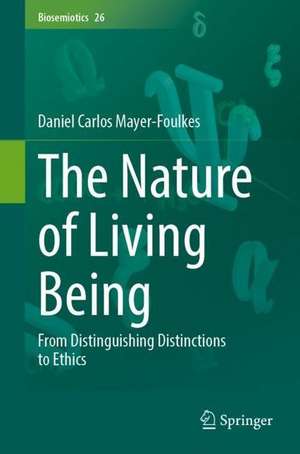The Nature of Living Being: From Distinguishing Distinctions to Ethics: Biosemiotics, cartea 26
Autor Daniel Carlos Mayer-Foulkesen Limba Engleză Hardback – 2 iun 2023
Din seria Biosemiotics
- 18%
 Preț: 948.92 lei
Preț: 948.92 lei - 15%
 Preț: 640.55 lei
Preț: 640.55 lei - 18%
 Preț: 783.20 lei
Preț: 783.20 lei - 15%
 Preț: 644.30 lei
Preț: 644.30 lei - 15%
 Preț: 583.61 lei
Preț: 583.61 lei - 18%
 Preț: 1559.94 lei
Preț: 1559.94 lei - 15%
 Preț: 647.08 lei
Preț: 647.08 lei - 24%
 Preț: 784.02 lei
Preț: 784.02 lei - 24%
 Preț: 777.07 lei
Preț: 777.07 lei - 18%
 Preț: 1660.18 lei
Preț: 1660.18 lei - 18%
 Preț: 1103.93 lei
Preț: 1103.93 lei - 15%
 Preț: 653.98 lei
Preț: 653.98 lei - 18%
 Preț: 722.43 lei
Preț: 722.43 lei - 18%
 Preț: 1004.48 lei
Preț: 1004.48 lei - 18%
 Preț: 780.82 lei
Preț: 780.82 lei - 24%
 Preț: 643.53 lei
Preț: 643.53 lei - 18%
 Preț: 794.07 lei
Preț: 794.07 lei - 18%
 Preț: 733.15 lei
Preț: 733.15 lei - 15%
 Preț: 700.42 lei
Preț: 700.42 lei - 18%
 Preț: 1845.44 lei
Preț: 1845.44 lei - 18%
 Preț: 941.38 lei
Preț: 941.38 lei - 18%
 Preț: 947.85 lei
Preț: 947.85 lei - 18%
 Preț: 1217.27 lei
Preț: 1217.27 lei - 18%
 Preț: 1661.13 lei
Preț: 1661.13 lei - 18%
 Preț: 1217.86 lei
Preț: 1217.86 lei - 18%
 Preț: 894.46 lei
Preț: 894.46 lei
Preț: 734.90 lei
Preț vechi: 896.22 lei
-18% Nou
Puncte Express: 1102
Preț estimativ în valută:
140.64€ • 152.71$ • 118.14£
140.64€ • 152.71$ • 118.14£
Carte tipărită la comandă
Livrare economică 22 aprilie-06 mai
Preluare comenzi: 021 569.72.76
Specificații
ISBN-13: 9783031247880
ISBN-10: 3031247884
Ilustrații: XIX, 320 p. 36 illus., 8 illus. in color.
Dimensiuni: 155 x 235 mm
Greutate: 0.65 kg
Ediția:1st ed. 2023
Editura: Springer International Publishing
Colecția Springer
Seria Biosemiotics
Locul publicării:Cham, Switzerland
ISBN-10: 3031247884
Ilustrații: XIX, 320 p. 36 illus., 8 illus. in color.
Dimensiuni: 155 x 235 mm
Greutate: 0.65 kg
Ediția:1st ed. 2023
Editura: Springer International Publishing
Colecția Springer
Seria Biosemiotics
Locul publicării:Cham, Switzerland
Cuprins
Chapter 1 Distinction-Distinguishing.- Chapter 2 Distinguishing Distinctions.- Chapter 3 ב and the Emergence of Living Being.- Chapter 4 Empirical Evidence for ב.- Chapter 5 Formal Definition of Distinction.- Chapter 6 The Mathematical Ideal and the Elision of the Subject.- Chapter 7 Four Kinds Of Things.- Chapter 8 [Subjects].- Chapter 9 Living Being.- Chapter 10 The Paradoxical Nature of Aliveness and [Ethics].
Notă biografică
Daniel Mayer (Mexico City, 1956) is a researcher in the epistemology of biology, an organizational consultant, and a leadership educator. For decades he has reflected on the nature of organization, both of organisms and of organizations. This is the topic of this book. This project began in the 1980’s during ten years work (four as curator) at The Monkey Sanctuary, then a world-renowned center for conservation of Amazon woolly monkeys in the UK, and has continued during his career as a consultant and as an educator. He has read papers on these topics at the Annual Lonergan Symposium, at Loyola Marymount University (Los Angeles, CA), at the Annual International Gathering in Biosemiotics, and is a regular participant in the Leadership for Change conferences at the University of San Diego. From 2005 to 2019 he was Adjunct Faculty for the Masters of Science in Organizational Leadership at National University, San Diego CA. Founder and CEO of Living Leadership (livingleadership.online), he designs and implements experiential team methodologies for online teaching based on the group-relations approach. Married to Mexican author Vicky Nizri, they have two children and six grandchildren.
Textul de pe ultima copertă
This book proposes a bold idea. Living beings are distinguishing distinctions. Single cells and multicellular organisms maintain themselves distinct by drawing distinctions. This is what organisms are and what they do. From this starting point, key issues examined range across ontology, epistemology, phenomenology, logic, and ethics. Topics discussed include the origin of life, the nature and purpose of biology, the relation between life and logic, the nature and limits of formal logic, the nature of subjects, the subject-object relation, subject-subject relationships and the deep roots of ethics. The book provides a radical new foundation to think about philosophy and biology and appeals to researchers and students in these fields. It powerfully debunks mechanical thinking about living beings and shows the vast reservoir of insights into aliveness available in the arts and humanities.
Caracteristici
Proposes that organisms must be understood in terms of their most fundamental activity of distinguishing Argues that distinction is the foundation of philosophy and biology Demonstrates that distinguishing is inherently anticipative, arbitrary, and continually unfolding
